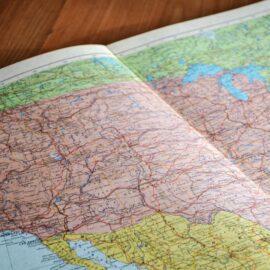

This article is an excerpt from the Shortform book guide to "A Moveable Feast" by Ernest Hemingway. Shortform has the world's best summaries and analyses of books you should be reading.
Like this article? Sign up for a free trial here .
In A Moveable Feast, why does Hemingway say that hunger was a good discipline? Why was Hemingway so poor when he was living in Paris?
When Ernest Hemingway was living in Paris, he often went hungry due to his lack of income. He was ashamed of himself and tried to hide his starvation from others.
In the memoir, he describes how hunger affected his moods and his work.
Hungry in Paris
Chapter eight in A Moveable Feast is titled “Hunger Was a Good Discipline.” Although Hemingway could live cheaply in Paris, there were times when being poor meant going hungry.
Not having enough money at times to eat was made more difficult in Paris by all of the bakeries selling delicious-smelling goods that people ate on the sidewalk. On an empty stomach, Hemingway walked to the Luxembourg museum, smelling treats the whole way, and looked at Cézanne’s paintings. He believed that on an empty stomach, his mind was clearer, and he could understand the motivations of the artists better. He felt that Cézanne himself probably had a sort of hunger when he painted, which he channeled into his work, as Hemingway channeled his hunger into writing.
After leaving the museum, Hemingway walked toward the Seine and Shakespeare and Company, taking a route that didn’t pass too many shops that sold food. By the time he reached Shakespeare and Company, all of the books looked different because his perceptions were heightened due to the lack of food. Sylvia Beach commented that he was thin and didn’t eat enough; he didn’t want to acknowledge not having money for food, so he said he was headed home for lunch.
Hemingway also complained to Beach about his trouble finding work since he’d stopped doing journalism. She brushed it off, but after he left the bookstore, he was frustrated with himself for complaining about his money problems. Beach, who was receiving mail at the store for Hemingway, had a letter with some money for him from a publisher in Germany, so he had a big lunch on the way home. At lunch, he thought about his recent publishing successes and failures in America.
Hemingway’s Stolen Manuscripts
Hemingway had gotten a short story called “My Old Man” published by Edward O’Brien in a book called Best Short Stories. It was one of only two stories he had left at the time, because all of his manuscripts had been stolen. While Hemingway was in Switzerland, Hadley had packed up his manuscripts to bring to him so that he could show them to an editor there. She briefly left the trunk unattended in the railway station, and when she came back to collect it, it was gone. Hadley had cried a lot when she told Hemingway the manuscripts had been stolen, and he had difficulty writing after that.
When he began to write again, he wrote “Out of Season,” a story that had a suggested, but not explicit, ending in which the main character hanged himself. Hemingway thought this sort of omission strengthened his stories—they became more like paintings, where you have to interpret the meaning and you get better at doing so the more art you see.
Hemingway knew that he eventually had to write a novel, but the idea was daunting when even writing short stories was difficult. He thought of it like running a marathon—he would have to train for it by writing shorter stories and build up eventually to the length of a novel. He had written one novel before, but it was stolen along with the rest of his work—and when he wrote it, he was younger and more carefree about his writing.
As Hemingway finished his lunch and started walking home, he began thinking about what he knew about best that he could write about. He decided to begin work on a story clearly about returning from war. The trick was, the story wouldn’t mention war.

———End of Preview———
Like what you just read? Read the rest of the world's best book summary and analysis of Ernest Hemingway's "A Moveable Feast" at Shortform .
Here's what you'll find in our full A Moveable Feast summary :
- Ernest Hemingway's autobiography about his life in Paris between 1921 and 1926
- How Hemingway knew so many other great authors of the time
- Why F. Scott Fitzgerald was a toxic yet valuable friend to Hemingway






